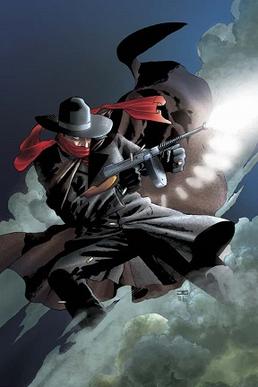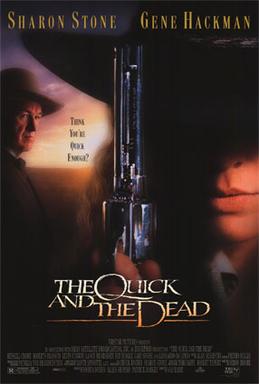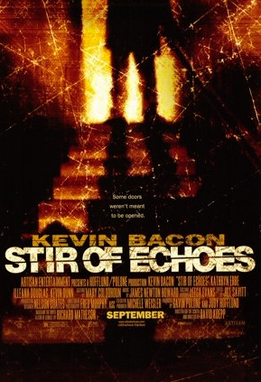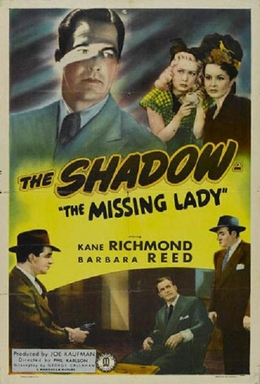
The Shadow is a fictional character created by American magazine publishers Street & Smith and writer Walter B. Gibson. Originally created to be a mysterious radio show narrator, and developed into a distinct literary character in 1931 by Gibson, The Shadow has been adapted into other forms of media, including American comic books, comic strips, serials, video games, and at least five feature films. The radio drama included episodes voiced by Orson Welles.

Spider-Man is a 2002 American superhero film based on the Marvel Comics character of the same name, created by Stan Lee and Steve Ditko. Directed by Sam Raimi from a screenplay by David Koepp, it is the first installment in Raimi's Spider-Man trilogy, produced by Columbia Pictures in association with Marvel Enterprises and Laura Ziskin Productions, and distributed by Sony Pictures Releasing. The film stars Tobey Maguire as the titular character, alongside Willem Dafoe, Kirsten Dunst, James Franco, Cliff Robertson, and Rosemary Harris. The film chronicles Spider-Man's origin story and early superhero career. After being bitten by a genetically altered spider, shy teenager Peter Parker develops spider-like superhuman abilities and adopts a masked superhero identity to fight crime and injustice in New York City, facing the sinister Green Goblin in the process.

Alexander Rae Baldwin III is an American actor, comedian, and producer. He is known for his leading and supporting roles in a variety of genres, from comedy to drama, and has received numerous accolades including three Primetime Emmy Awards and three Golden Globe Awards as well as nominations for a Academy Award, a BAFTA Award, and Tony Award.

Penelope Ann Miller, sometimes credited as Penelope Miller, is an American actress. She began her career on Broadway in the original run of Biloxi Blues (1985–1986), later appearing in the 1988 film adaptation of the same name. After playing small roles in the comedies Adventures in Babysitting (1987) and Big Top Pee-wee (1988), and receiving a Tony Award nomination for her leading role in the Broadway revival of Our Town (1988–1989), Miller came to prominence with a succession of major parts in films such as The Freshman, Awakenings, Kindergarten Cop, Other People's Money (1991), Chaplin (1992), The Shadow (1994), and The Relic (1997). For her portrayal of exotic dancer Gail in Carlito's Way (1993), she was nominated for the Golden Globe Award for Best Supporting Actress.

Spider-Man 2 is a 2004 American superhero film based on the Marvel Comics character of the same name. Directed by Sam Raimi and written by Alvin Sargent from a story conceived by Michael Chabon and the writing team of Alfred Gough and Miles Millar, the film was produced by Columbia Pictures in association with Marvel Enterprises and Laura Ziskin Productions, and distributed by Sony Pictures Releasing. It is the second installment in Raimi's Spider-Man trilogy and the sequel to Spider-Man (2002). The film stars Tobey Maguire as Peter Parker / Spider-Man, alongside Kirsten Dunst, James Franco, Alfred Molina, Rosemary Harris, and Donna Murphy. Set two years after the events of Spider-Man, the film finds Peter Parker struggling to stop scientist Dr. Otto Octavius from recreating the dangerous experiment that killed his wife and left him neurologically fused to mechanical tentacles, while also dealing with an existential crisis between his dual identities that appears to be stripping him of his powers.

David Koepp is an American screenwriter and director. He is the ninth most successful screenwriter of all time in terms of U.S. box office receipts with a total gross of over $2.3 billion. Koepp has achieved both critical and commercial success in a wide variety of genres: thriller, science fiction, comedy, action, drama, crime, superhero, horror, adventure, and fantasy.

Carlito's Way is a 1993 American crime drama film directed by Brian De Palma and written by David Koepp, based on the novels Carlito's Way (1975) and After Hours (1979) by Judge Edwin Torres. It stars Al Pacino, Sean Penn, Penelope Ann Miller, Luis Guzman, John Leguizamo, Jorge Porcel, Joseph Siravo, and Viggo Mortensen.

Spider-Man 3 is a 2007 American superhero film based on the Marvel Comics character Spider-Man. Produced by Columbia Pictures, Marvel Studios, and Laura Ziskin Productions, and distributed by Sony Pictures Releasing, it was directed by Sam Raimi from a screenplay he co-wrote with his brother Ivan and Alvin Sargent. It is the third and final installment in Raimi's Spider-Man trilogy, and the sequel to Spider-Man (2002) and Spider-Man 2 (2004). The film stars Tobey Maguire as Peter Parker / Spider-Man, alongside Kirsten Dunst, James Franco, Thomas Haden Church, Topher Grace, Bryce Dallas Howard, James Cromwell, Rosemary Harris, and J. K. Simmons. It also marks the final film appearance of Cliff Robertson before his retirement in the same year and his subsequent death in 2011.

The Quick and the Dead is a 1995 American revisionist Western film directed by Sam Raimi, and starring Sharon Stone, Gene Hackman, Russell Crowe, and Leonardo DiCaprio. The screenplay was written by Simon Moore, but includes contributions from Joss Whedon. The story focuses on "The Lady" (Stone), a gunfighter who rides into the frontier town of Redemption, controlled by John Herod (Hackman). The Lady joins a deadly dueling competition in an attempt to exact revenge for her father's death.
Walter Brown Gibson was an American writer and professional magician, best known for his work on the pulp fiction character The Shadow. Gibson, under the pen-name Maxwell Grant, wrote "more than 300 novel-length" Shadow stories, writing up to "10,000 words a day" to satisfy public demand during the character's golden age in the 1930s and 1940s. He authored several novels in the Biff Brewster juvenile series of the 1960s. He was married to Litzka R. Gibson, also a writer, and the couple lived in New York state.

The Golden Master (1939) is an American pulp novel featuring The Shadow, written by Walter Gibson under the house name Maxwell Grant. This was the 182nd Shadow story and it was published in The Shadow Magazine Vol. 31, No. 2 on 15 September 1939.

Ghosts of Mississippi is a 1996 American biographical courtroom drama film directed by Rob Reiner and starring Alec Baldwin, Whoopi Goldberg, and James Woods. The film is based on the 1994 trial of Byron De La Beckwith, a white supremacist accused of the 1963 assassination of civil rights activist Medgar Evers.

Stir of Echoes is a 1999 American supernatural horror film written and directed by David Koepp and based on the 1958 novel of the same name by Richard Matheson. The film stars Kevin Bacon, Kathryn Erbe, Illeana Douglas and Kevin Dunn.

The Shadow is a 1994 pinball game designed by Brian Eddy and released by Midway. It is based on the 1994 movie of the same name.

Margo Lane is a fictional character in The Shadow stories. Margo is a friend and companion to Lamont Cranston, and an agent for his alter ego, The Shadow, in the wealthy set. Her first appearance was in 1937 in The Shadow radio drama. Her first appearance in a print story was in The Thunder King, a story in the June 15, 1941, issue of The Shadow Magazine.

The Shadow (1940) was the ninth serial released by Columbia Pictures. It was based upon the classic radio series and pulp magazine superhero character of the same name.

Rock of Ages is a 2012 American jukebox musical comedy film directed by Adam Shankman and based on the rock jukebox Broadway musical Rock of Ages by Chris D'Arienzo. Starring Julianne Hough and Diego Boneta in his film debut leading an ensemble cast that includes Russell Brand, Alec Baldwin, Paul Giamatti, Catherine Zeta-Jones, Malin Åkerman, Mary J. Blige, Bryan Cranston and Tom Cruise, the film features the music of many 1980s rock artists including Def Leppard, Journey, Scorpions, Poison, Foreigner, Guns N' Roses, Pat Benatar, Joan Jett, Bon Jovi, Twisted Sister, Whitesnake, REO Speedwagon, and others.

Jack Ryan: Shadow Recruit is a 2014 American action thriller film based on the character Jack Ryan created by author Tom Clancy. It is the fifth film in the Jack Ryan series and the second reboot thereof. Unlike its predecessors, it is not an adaptation of a particular Clancy novel, but rather an original story. Chris Pine stars in the title role, becoming the fourth actor to play Ryan, following Alec Baldwin, Harrison Ford, and Ben Affleck. The film is directed by Kenneth Branagh, who also stars alongside Kevin Costner, and Keira Knightley.

The Missing Lady is a 1946 American mystery film directed by Phil Karlson and starring Kane Richmond and Barbara Read. It was the third and final in a series of three films released by Monogram in 1946 starring Richmond as The Shadow, the others being The Shadow Returns and Behind The Mask.

The following is a list of unproduced Sam Raimi projects in roughly chronological order. During his long career, American film director and producer Sam Raimi has worked on a number of projects which never progressed beyond the pre-production stage under his direction. Some of these projects, are officially cancelled and scrapped or fell in development hell.



















